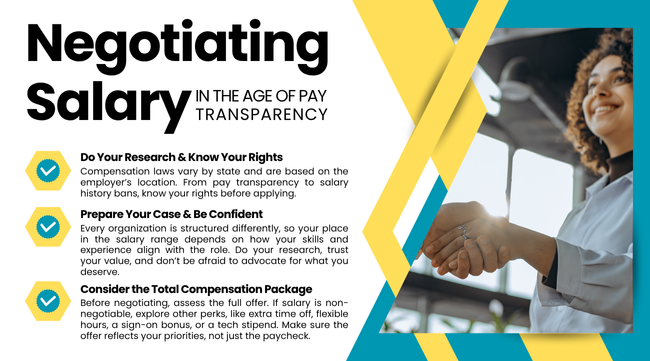
Salary negotiations are often one of the most nerve-wracking, and arguably most important, parts of the interview process. A well-handled compensation conversation can influence the final decision for both the employer and the candidate, making it a critical step that warrants thoughtful strategy. As pay transparency laws gain traction across the United States, job seekers must be ready to navigate these conversations with confidence, clarity, and a solid understanding of their evolving rights.
The New Pay Transparency Landscape
In the world of hiring and job searching, much has changed over the last five years. As of March 2025, 16 U.S. states have enacted some level of pay transparency legislation. What does this mean? In general, employers in these jurisdictions are required to disclose good-faith compensation information in efforts “to promote fairness and reduce pay disparities based on factors like gender, race, and ethnicity.” The legal requirements vary by location, but the overall goal is the same.
Benefits of Pay Transparency
Pay transparency benefits both employers and employees, current and prospective. For employers, disclosing compensation ranges upfront attracts a broader and more qualified applicant pool, fosters trust, and contributes to bridging the gender and racial pay gaps.
For job seekers, transparency is both a time-saver and a confidence booster. Knowing salary expectations early on helps you prioritize opportunities that align with your financial needs and professional value. Rather than guessing or waiting until the end of the interview process, you can focus your energy on roles that truly match your goals and needs.
Salary Negotiation Tips
Do Your Research & Know Your Rights
Understanding the laws where you’re applying is essential, especially as transparency regulations vary widely across the country. In addition to these laws, many states have also enacted salary history bans, which prevent employers from asking about your current or past compensation. This is especially relevant with the rise of remote work, as your rights are often tied to the employer’s location, not just your own.
Even if an employer isn’t legally required to share salary information, you can still request it. If you’re comfortable, explain why transparency is important to you and how it contributes to an open, equitable process for both parties.
Prepare Your Case & Be Confident in Your Value
Every organizational structure is different. Your skills, qualifications, and experience determine your market value. So, take an honest, deep dive into your work history and compare it to the requirements and responsibilities of the job to determine where you fall within the salary range provided and prepare a strong case for an effective negotiation.
If a job offer comes in at the bottom of the stated range, or even below, take these steps before responding:
- Revisit the job description you applied for to confirm the salary range
- Review the entire package to see if other benefits make up for a lower base salary
- Ask how the offer was calculated and what factors influenced it
Don’t let yourself get in the way of reaching for the stars. Once you’ve done your homework, trust your assessment. If your background and expertise warrant a higher salary, advocate for it. Self-doubt is natural, but it shouldn’t keep you from securing what you deserve.
Salary is Just a Piece: Consider the Total Package
While salary may be a very large piece of the compensation package, it’s important to evaluate the entire offer before opening up for negotiation. Ask yourself:
- What is the flexibility to work remotely?
- Is there much travel?
- Is technology provided?
- How comprehensive are the health benefits?
If, while negotiating a salary offer, there is no wiggle room on the salary, consider what other benefits are of value to you that can be negotiated. Additional time off, schedule flexibility, sign-on bonus, technology stipend, etc. Compensation should reflect your priorities, not just a number on a paycheck.

As salary transparency continues to normalize across the United States, job seekers have more tools than ever to advocate for fair and informed compensation. By understanding the laws in your area, doing your research, and preparing a strong case, you can approach salary negotiations with clarity and confidence. And just because an offer is made, doesn’t mean you have to accept it. If it doesn’t reflect your value or meet your needs, it’s okay to say no. You’re not just looking for a job, you’re looking for the right fit.
Did you know that JOHNLEONARD’s Staffing Consultants conducts a thorough interview prep with candidates before each interview? Partner with us to elevate your job search and land your dream job!
